18-19 Unit 4 Section Ⅲ Grammar——动词-ing形式作定语和状语
- 格式:doc
- 大小:37.52 KB
- 文档页数:6
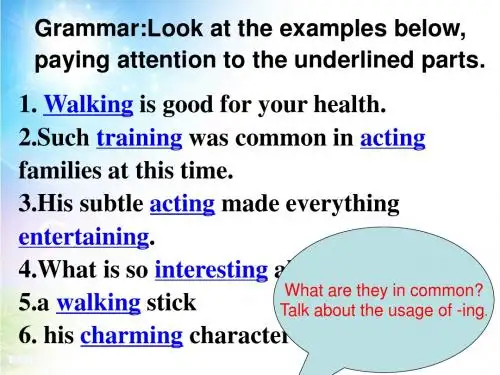
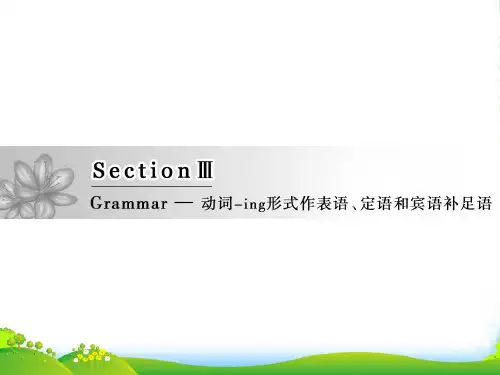
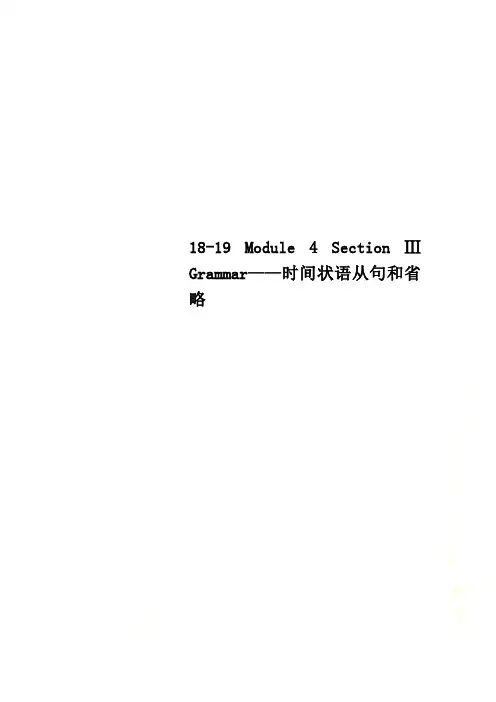
18-19 Module 4 Section ⅢGrammar——时间状语从句和省略while 从句谓语用延续性动词表示两个延续性动作同时发生且具有对比意味,或一个动作发生在另一个动作进行的过程中as 强调主、从句动作同时发生表示“一边……一边……”之意他父亲去世时他才九岁。
Jack was working in the lab when the power cut occurred.杰克正在实验室里工作,这时突然停电了。
They arrived while we were having dinner.他们到时我们正在吃晚饭。
While I played the piano,my sister did her homework.我弹钢琴的时候姐姐在做作业。
As years go by,China is getting stronger and richer.随着时间一年一年过去,中国变得越来越富强了。
I saw my mother as I was getting off the bus.我下公共汽车的时候看见了我妈妈。
[名师点津]when在be about to do...when...,be doing...when...,had done...when...,be on one's way...when...,be on the point of doing...when...等结构中,作“正在那时”讲,表示某个动作正在发生或刚刚发生,另一动作同时发生。
He was about to leave when someone knocked at the door.他刚要离开就有人敲门。
[即时演练1]选词填空:when,while,as①It's much easier to make friends when you have similar interests.②While/When in Vienna he studied music.③You will grow wiser as you grow older.2.until,till的用法主句形式主句谓语意义肯定句用延续性动词意为“直到……为止”,表示主句中的动作到从句动作发生时结束否定句用短暂性动词意为“直到……才……”,表示主句中的动作到从句动作发生时开始He waited until she had finished speaking.他一直等到她讲完。

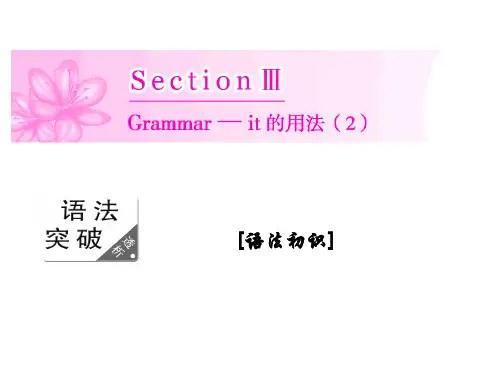
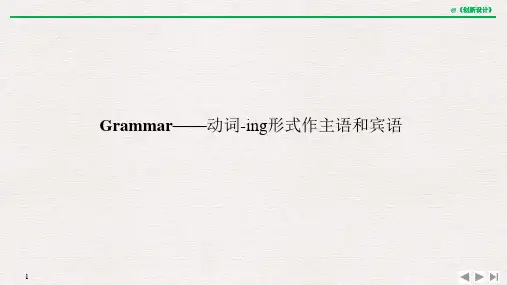
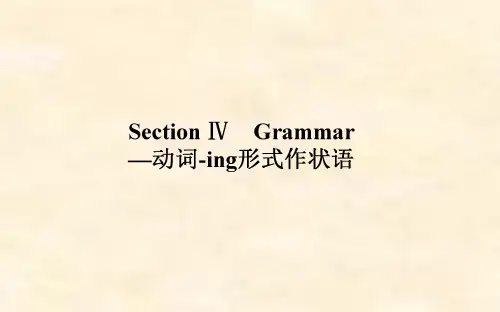
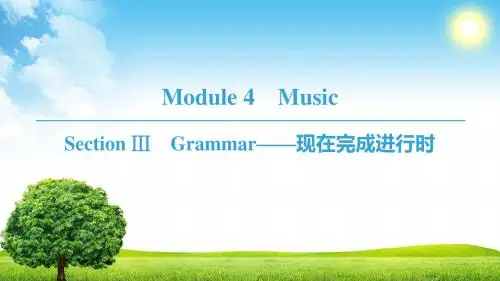
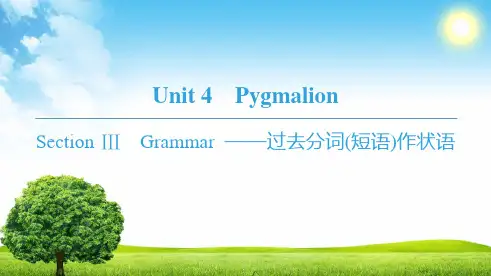
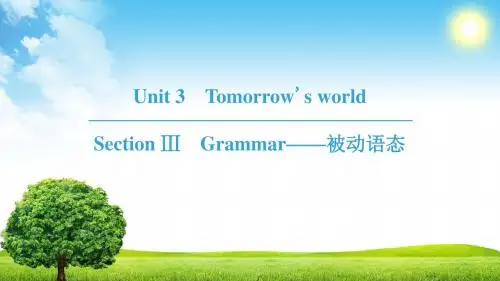
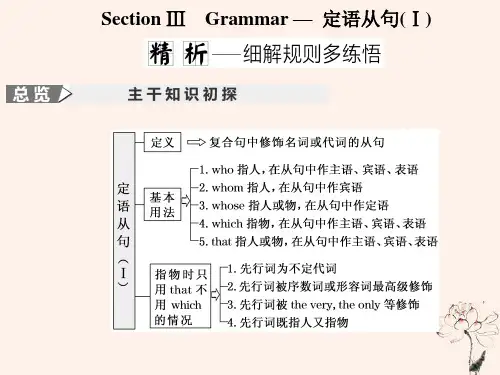
动词-ing形式(短语)作表语和宾语补足语一、动词-ing形式(短语)作表语★一些表示状态、品质、情绪的动词-ing形式可作表语。
如:It’s amazing that you should know that!The test results have been very discouraging.The reason he gave was not very convincing.The photograph is missing.★动词-ing形式(短语)作表语,有时说明主语的内容。
如:Henry’s job is teaching physics in a local middle school.My brother’s favorite activity is hiking.注意: 当动词-ing形式(短语)表示经常性的动作时,可以和主语互换位置。
如:Mr. Wang’s favorite exercise is running around the block.= Running around the block is Mr. Wang’s favorite exerc ise.二、动词-ing形式(短语)作宾语补足语★动词-ing形式(短语)作宾语补足语,强调宾语发出的动作正在进行。
后可跟动词-ing形式(短语)作宾语补足语的动词有set, catch, find, have, keep, get, leave, make, feel, see, hear, notice, observe, watch等。
如:When I entered the room, I saw the children jumping on the bed.I heard them singing that nice English song.注意: 动词-ing形式(短语)作宾语补足语时句子可以变为被动语态。
Section ⅢGrammar——动词-ing形式作定语和状语[语境自主领悟]一、动词-ing形式(现在分词)由“动词原形+-ing”构成,在句子中可以作主语、定语、表语、宾语补足语和状语动词-ing形式的基本形式如下:) 学生们走在街上,又说又笑。
Having worked for two days,Steve managed to finish his report on schedule.已经忙活了两天,史蒂夫设法按时完成了他的报告。
Having struggled for many years,he was finally admitted to a key university.经过多年的努力,他最终被一所重点大学录取。
Having been laughed at for his mistakes,the boy was very upset.那男孩因犯错而被嘲笑,他非常沮丧。
[名师点津]动词-ing形式的一般式常表示该动作与句子谓语动作同时发生,而动词-ing 形式的完成式则表示该动作发生在谓语动作之前。
[即时演练1]单句语法填空①I like staying up late watching (watch) TV,surfing the Internet or doing something I'm fond of.②Having lived (live) in Beijing for years,I almost know every place quite well.③Seeing (see) nobody at home,he decided to leave them a note.【导学号:21122031】二、动词-ing形式在句中作定语和状语1.动词-ing形式作定语。
The firefighters dashed into the burning woods to save people trapped in it.(前置定语)消防队员冲进了正在燃烧的丛林,去营救被困人员。
The boy standing there is a classmate of mine.(后置定语)站在那儿的那个男孩是我的一个同班同学。
The building being built over there is our library.(后置定语,强调“正在被建”)那里正在建造的大楼是我们的图书馆。
2.动词-ing形式作状语。
(1)作时间状语。
Hearing the news,he couldn't help laughing.=When he heard the news,he couldn't help laughing.一听到那个消息,他禁不住大笑起来。
(2)作原因状语。
Not knowing her address,I had better telephone her to come over.=As I don't know her address,I had better telephone her to come over.由于不知道她的地址,我还是打电话让她过来为好。
(3)作条件状语。
Working hard,you'll surely succeed.=If you work hard,you'll surely succeed.如果努力工作,你就一定会成功。
(4)作结果状语。
The child slipped and fell,hitting his head against the door.=The child slipped and fell,and hit his head against the door.那男孩滑了一跤,头撞到了门上。
[名师点津]现在分词作结果状语,是随着谓语动词的发生而产生的自然结果,而不定式作结果状语时常表示出乎意料的结果,有时前面可以加only。
I hurried to school,only to find it was Sunday.我匆忙赶到学校,结果发现是星期天。
(5)作让步状语。
Having been told many times,he still didn't learn these rules by heart.=Although he had been told many times,he still didn't learn these rules by heart.尽管被告知了很多次,他还是没把这些规定记住。
(6)作伴随状语。
Morris lay on the grass,staring at the sky for a long time.=Morris lay on the grass and stared at the sky for a long time.莫里斯躺在草地上,长时间地望着天空。
The boy sat in front of the farm-house,cutting the branches.=The boy sat in front of the farm-house,and cut the branches.那个男孩坐在农舍前砍树枝。
(7)作方式状语。
He came running back to tell me the news.他跑回来告诉我这个消息。
[名师点津]动词-ing形式作状语时,相当于与之对应的状语从句,但是当作伴随状语及结果状语时,可转化为并列谓语。
[即时演练2]句型转换(用非谓语动词变换句子)①It rained heavily and it caused great damage.→It rained heavily,causing great damage.②After he had eaten his dinner,the boy rushed out.→Having eaten his dinner,the boy rushed out.③All night long he lay awake and he thought of the problem.【导学号:21122032】→All night long he lay awake,thinking of the problem.三、现在分词作状语注意事项1.现在分词的时态现在分词作状语时,要注意分词的时间性,是用现在分词的一般式(doing),还是用完成式(having done)。
(1)当现在分词的动作与谓语动词的动作同时发生时,用分词的一般式。
Walking in the street,I met an old friend of mine.我正在大街上行走时,遇到了一位老朋友。
(walking和谓语动词met同时发生)(2)当现在分词的动作先发生,而谓语动词的动作后发生时,用分词的完成式。
Having finished the letter,he went to post it.他写完信后就把它寄了出去。
(having finished是先发生的,went是后发生的) 2.现在分词的语态使用现在分词的主动式还是被动式,这主要取决于现在分词和句子主语之间的关系。
句子的主语就是分词的逻辑主语。
Having been shown around the factory,they were very happy.(现在分词的被动式)被领着参观了工厂后,他们很高兴。
Having finished his homework,he went to bed.(现在分词的主动式)完成了作业后,他上床睡觉。
3.动词-ing形式的否定式:not+v.-ing;not having+v.-edNot knowing this,he didn't come.他不知道这件事,所以没来。
Not having made full preparations,we put off the sports meeting.因为没有做好充分的准备,我们把运动会延期了。
4.现在分词作评注性状语有些现在分词在句中没有逻辑主语,它们往往作为句子的评注性状语来修饰整个句子,表明说话者的态度、观点等。
例如:generally speaking“一般来说”,judging by/from ...“从……判断”,taking everything into consideration“从全盘考虑”。
Judging from his behaviour,he must be mad.从他的行为来判断,他一定是疯了。
[即时演练3]单句语法填空①Having worked (work) for three hours,he took a rest.②Tom came dashing (dash) into the room with some film tickets in his hand.③Having spent (spend) all his money,the boy had to give his mother a call.[语法应用落实]Ⅰ.单句语法填空1.He often carefully watched the doctors in the operating (operate) room.2.Seen (see) from the tower,the city looks very beautiful.3.Those students hoping (hope) to enter that university should work really hard.4.Working (work) harder at English,you'll make greater progress.5.To finish (finish) the work ahead of time,we have to work hard.6.Do you remember the name of the girl sitting (sit) next to you in the old photo?7.Tom received a phone call from his mother saying (say) that she would visit him this weekend.8.The boy wearing (wear) a sad look said,“I can't find my parents.”【导学号:21122033】9.Leaving (leave) some questions unanswered,my friend said goodbye to me.10.When you meet people from different cultures,it is important to understand (understand) what you can and cannot do.11.The children rushed out of the classroom,talking (talk) about something happily.12.With the rapid development of China,the number of foreigners learning (learn) Chinese is growing all the time.13.Not realizing (realize) that he had hurt Shirley,Jordan continued to shout at her.14.Hearing (hear) the signal,people ran out of the building.15.Having selected (select) the proper present,they sent it to their respectable professor.Ⅱ.完成句子1.因粗鲁行为而向老师道歉后,他许诺以后将不再犯同样的错误。